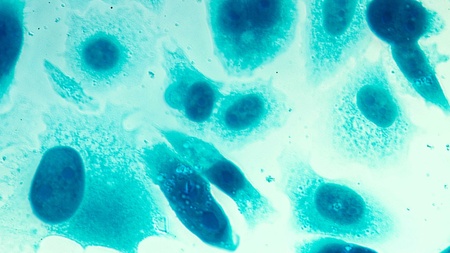A scientist at the University of Aberdeen has received a major award to develop a new way to treat prostate cancer.
Prostate cancer kills 30 people a day in the UK, and could kill 50 men a day by 2035.
Many men with prostate cancer receive hormone treatment, which works by stopping male hormones like testosterone feeding the cancer.
The problem is that some cancers become resistant to hormone treatment.
Professor Iain McEwan, at the University of Aberdeen, will lead a drug discovery project to explore new ways to attack treatment-resistant cancer.
His work is supported by the charity Prostate Cancer Research Centre (PCRC).
The main focus of Professor McEwan's research has been the androgen receptor - the protein in the body that binds the hormone testosterone, which has been a major focus of his research ever since.
Male hormones help prostate cancer to grow and spread by attaching to proteins called androgen receptors (AR). When these hormones attach to the AR, it is like they switch the AR on. Many prostate cancer drugs work by attaching to the AR, physically blocking hormones from being able to switch it on. In some men, the AR itself changes, so that it’s always switched on, and it’s missing the part that drugs normally attach to. Iain’s research team are working on attaching drugs to a different, but equally important part of the AR. Hopefully, this could keep hormone therapy working for men with prostate cancer.
These awards are part of a larger, £2.3 million investment in research by PCRC, which was announced last week. PCRC focus on funding research and innovation into prostate cancer, particularly advanced prostate cancer, which is what kills. Their recent funding will boost the amount spent on prostate cancer research in the UK by 10% at a time that overall prostate cancer research funding is decreasing even though the disease is likely to affect more and more men in coming years.
Professor Iain McEwan said: “We aim to develop novel ways of switching off the activity of a protein called the androgen receptor, which is key to prostate cancer cell survival. Our highly innovative approach marries medicinal chemistry with biologics (protein-based drugs), and if successful has the potential to significantly improve the outcome for men with advanced disease.”
Oliver Kemp, CEO of PCRC, said: “We want to find inspiring scientists with great ideas that need support to make their ideas a reality. Our single long term aim is for all people with Prostate Cancer to receive personalised effective care that enables them to live full and healthy lives.”
Dr Naomi Elster, PCRC’s Research Manager, said: “Hormone therapy is one of the main treatments for prostate cancer but it can stop working. This is a really exciting project which could have real and profound benefits for patients. We’re also delighted, with this grant, to be extending our funding into Scotland, which has such a rich scientific heritage.”


